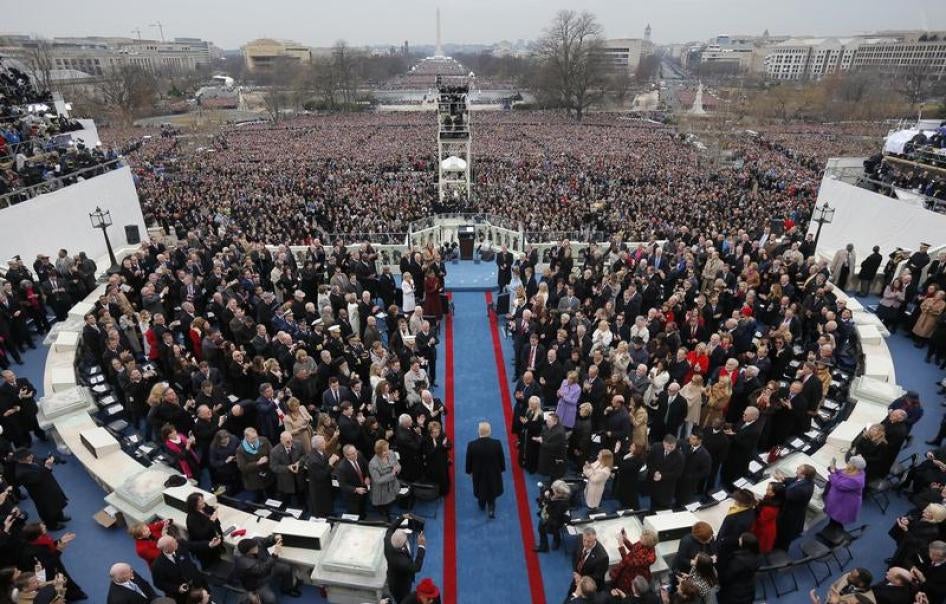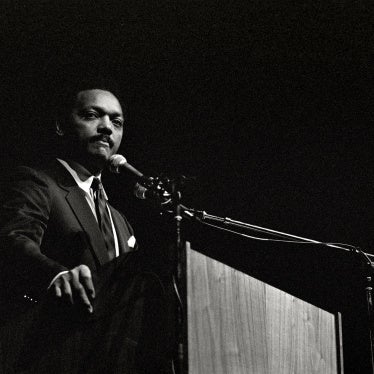If anyone remained this Friday who still hoped that Donald Trump would not govern as he campaigned, who believed that the awesome weight of office, or the containing force of American institutions would bend him to some domesticated crouch, he has left them no further room for doubt.
His inaugural speech was a blood-and-soil rallying cry straight out of the 1930s, a promise that “total allegiance to the United States of America” would act as a balm for the “carnage” of de-industrialisation, and a universal solvent for ingrained racism.
“We will be protected”, he declared, “by the great men and women of our military and law enforcement. And most importantly, we will be protected by God... It’s time to remember that old wisdom our soldiers will never forget, that whether we are black or brown or white, we all bleed the same red blood of patriots”.
This is the language of hard nationalism. In the “America first” vision advanced by Trump and his chief strategist, Stephen K Bannon, it isn’t our mutual recognition of shared humanity that protects us against hatred, it isn’t the laws and rights that enshrine and protect our dignity, but submission to a narrow ideal of the nation, secured by soldiers, policemen and God.
This is not a worldview that will be unfamiliar to anyone in India, where similar sentiments are captured in the “nation first” advice offered with such tiresome regularity to dissenters: “Go to Pakistan”.
Similarly, it will surprise very few in India that President Trump’s long war on the press only intensified, once the bully pulpit was his. All modern political leaders seek control of the narrative, but for populists who promise sweeping change from below, spin will not suffice. They must shape not just the story, but the basic facts, in order to defang the truth-based accountability system that is built around them. For them, the press is easy foil, a stand-in for the “corrupt system” in Lutyens’ Delhi, or inside the Beltway, but it is also a threat. Attacking its legitimacy helps to cement your own, both politically and structurally.
On Saturday, Sean Spicer, the White House press secretary, took his first turn at the podium. What he chose to do there, was instructive.
First, he launched a sweeping attack on the assembled journalists claiming that reporting on crowd sizes at the inauguration was “deliberately false”.
Spicer then launched into a series of whoppers of his own, all them easily given the lie within minutes: He overstated the number of people to the festivities on the DC Metro, made false claims about the use of grass-protecting tiles which highlighted empty areas along the national mall, and about the use of access control systems, all en route to insisting that “This was the largest audience to ever witness an inauguration — period — both in person and around the globe”.
Spicer took his cue from President Trump, who had told assembled CIA staff a few hours earlier that the media are “some of the most dishonest people on the planet” before insisting, among other false statements, that the sun had come out as he finished speaking. It hadn’t.
When you cannot believe the president himself on a subject as basic as cloud cover, it is time to accept that the phrase “post-truth” is already worn out. Helpfully, Kellyanne Conway, Trump’s most emollient and reliable representative appeared on “Meet the Press” the next morning to baptise lies with a new name, “alternative facts”.
Trump needs alternative facts because nominal allegiance to the truth is a condition of democratic systems. To lie baldly from the White House is to insist that you own the truth by virtue of your authority as a representative of the popular will. Popular support bends the facts to your requirements, and inoculates you against the kind of secrets presidents used to lie about: Watergate, Monica Lewinsky, Weapons of Mass Destruction, tax returns, Russia.
It is no accident, then, that the weekend’s tussle over facts centred on crowd size as a proxy for popularity. Donald Trump’s crowds have to be the biggest ever. His ratings too. And his favourability numbers, digital audience metrics, retweets. Anything else feeds what Spicer, and Conway describe as a “narrative of de-legitimization” of his presidency.
Of course they are wrong. Very few people argue that Trump is not legitimately president. But the narrow legitimacy of an electoral college victory, popular vote defeat, and presidential authority hemmed in by democratic constraints is not a sweeping mandate for revolution.
Just outside the briefing room, and across America, as Spicer spoke, more than three million people were marching in support of women’s rights.
Their bodies on the streets were an incontrovertible challenge — a fact to which the administration could offer no alternative.
Americans who love their democracy will need more of those in the years to come.









